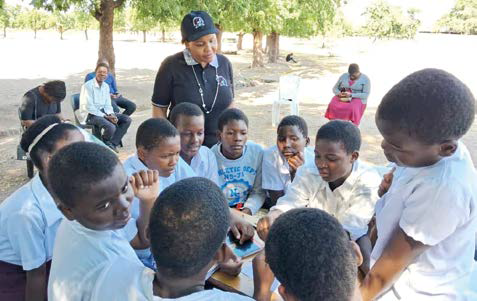By Barbara Kachinangwa
On a sweltering morning at Ngabu Secondary School in Chikwawa District, buzzing teenage girls chatter with an air of anticipation.
Neatly dressed in school uniforms, over a hundred curious learners from three secondary schools have convened to hear inspiring stories and tips from women engineers who had once sat in the chairs like theirs.
These are pacesetting women in one of the world’s most male-dominated fields.
They have convened the career talk to redefine engineering, especially how girls, often left behind, view the application of science and mathematics to solve real-life problems.
The Malawi Engineering Institute has embarked on the nationwide initiative to encourage girls to consider careers in science, technology, engineering, and mathematics (Stem).
The talk features four trailblazing women civil, manufacturing and mechanical engineers.
“I grew up in a small village where girls grew up being told to become nurses or teachers. There’s nothing wrong with those careers, but I loved building things with my hands,” says civil engineer Cardine Nkowansenga.
She is soft-spoken, yet a commanding presence for the girls who are listening pensively.
Her humble beginnings personify the story of many girls from rural areas, home to at least four in every five Malawians, according to the 2018 census.
She narrates: “When I was selected to study engineering at the Malawi University of Business and Applied Sciences, I was over the moon. We were just a few girls in a class full of boys, but I was not fazed by the gender imbalance. I am a full engineer.”
Her young hearers nodded in agreement and others took notes.
For her colleague Engineer Lissah Msanama, engineering is not just about making machines or bridges.
“It’s about solving real problems that we face every day,” says the engineer who develops efficient manufacturing processes for products.
Taking turns, the youthful engineers shared their personal stories, challenges and triumphs with unique technical brilliance and a human face.
They had to confront self-doubt, piling pressure to conform and cultural expectations.
“Being the only woman in a room full of men is hard, but it also means you’re a pioneer. You’re opening doors,” says Msanama.
The personal accounts sparked dozens of questions from girls eager to chart their own career paths in a country where about half of them marry before their 18th birthday, the legal marriageable age.
One girl asked: “What subjects can help one become an engineer? Can I become an engineer if I’m not good at maths?”
The answers were honest and encouraging.
“Yes, maths is important, but don’t worry if it’s hard now. You’ll get better with practice. What’s more important is curiosity and the courage to keep going,” replied Msanama.
After the talk, girls who had never considered engineering until that morning, circled the engineers, jostling to grab an extra tip or two.
“I always thought engineering was for boys, but now I know that the door is open for anyone who wants to change the world,” said Form Two student Allanita Mponda.
Faith Kanthunkako, from Makande Community Day Secondary School in the vicinity, promised to work harder to become a water engineer.
“Maths can be difficult, but I practice more often to pass well and become an engineer who can solve water problems in communities like mine, where water points are saline and far apart,” she said.
For engineer Mtondera Manda, these girls are not just future leaders, but the present dreamers.
“If we plant the seed today, in ten years, we’ll have built an entire forest of women engineers,” she said.
Concurring, Women in Engineering, the institution’s chapter, chairperson Mirriam Nsomba highlighted the need to give schoolgirls sound career tips.
“We want to drive girls into Stem careers so they can solve the problems humanity faces today,” she states. “Our institute is committed to creating conducive environments for girls to thrive and become women of substance in these fields.”
During the career talk, students showcased their innovations such as towels and houses made of simple materials.
Globally, women represent about 16 percent of engineers and the count is disproportionately low in developing countries, including Malawi.
However, studies show that diverse engineering teams perform better, create more inclusive solutions and inspire innovation.
The school outreach, career talks, mentorship programmes and scholarships help narrow the gender gap, ensuring girls know their place in every lab, workshop, and boardroom.
